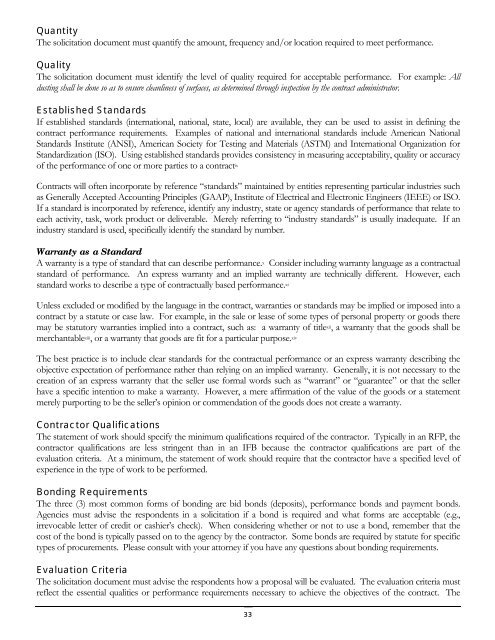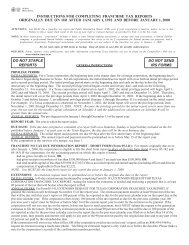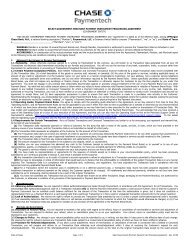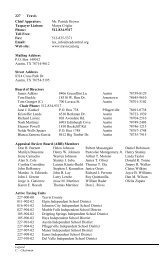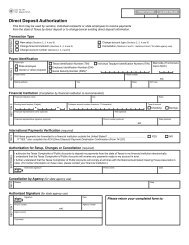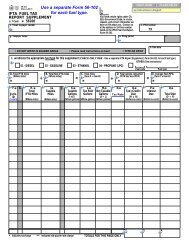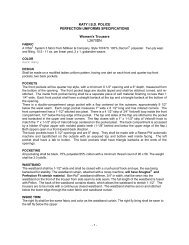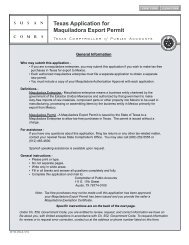Contracts Management Guide - Texas Comptroller of Public Accounts
Contracts Management Guide - Texas Comptroller of Public Accounts
Contracts Management Guide - Texas Comptroller of Public Accounts
You also want an ePaper? Increase the reach of your titles
YUMPU automatically turns print PDFs into web optimized ePapers that Google loves.
Quantity<br />
The solicitation document must quantify the amount, frequency and/or location required to meet performance.<br />
Quality<br />
The solicitation document must identify the level <strong>of</strong> quality required for acceptable performance. For example: All<br />
dusting shall be done so as to ensure cleanliness <strong>of</strong> surfaces, as determined through inspection by the contract administrator.<br />
Established Standards<br />
If established standards (international, national, state, local) are available, they can be used to assist in defining the<br />
contract performance requirements. Examples <strong>of</strong> national and international standards include American National<br />
Standards Institute (ANSI), American Society for Testing and Materials (ASTM) and International Organization for<br />
Standardization (ISO). Using established standards provides consistency in measuring acceptability, quality or accuracy<br />
<strong>of</strong> the performance <strong>of</strong> one or more parties to a contract ix<br />
<strong>Contracts</strong> will <strong>of</strong>ten incorporate by reference “standards” maintained by entities representing particular industries such<br />
as Generally Accepted Accounting Principles (GAAP), Institute <strong>of</strong> Electrical and Electronic Engineers (IEEE) or ISO.<br />
If a standard is incorporated by reference, identify any industry, state or agency standards <strong>of</strong> performance that relate to<br />
each activity, task, work product or deliverable. Merely referring to “industry standards” is usually inadequate. If an<br />
industry standard is used, specifically identify the standard by number.<br />
Warranty as a Standard<br />
A warranty is a type <strong>of</strong> standard that can describe performance. x Consider including warranty language as a contractual<br />
standard <strong>of</strong> performance. An express warranty and an implied warranty are technically different. However, each<br />
standard works to describe a type <strong>of</strong> contractually based performance. xi<br />
Unless excluded or modified by the language in the contract, warranties or standards may be implied or imposed into a<br />
contract by a statute or case law. For example, in the sale or lease <strong>of</strong> some types <strong>of</strong> personal property or goods there<br />
may be statutory warranties implied into a contract, such as: a warranty <strong>of</strong> title xii, a warranty that the goods shall be<br />
merchantable xiii, or a warranty that goods are fit for a particular purpose. xiv<br />
The best practice is to include clear standards for the contractual performance or an express warranty describing the<br />
objective expectation <strong>of</strong> performance rather than relying on an implied warranty. Generally, it is not necessary to the<br />
creation <strong>of</strong> an express warranty that the seller use formal words such as “warrant” or “guarantee” or that the seller<br />
have a specific intention to make a warranty. However, a mere affirmation <strong>of</strong> the value <strong>of</strong> the goods or a statement<br />
merely purporting to be the seller’s opinion or commendation <strong>of</strong> the goods does not create a warranty.<br />
Contractor Qualifications<br />
The statement <strong>of</strong> work should specify the minimum qualifications required <strong>of</strong> the contractor. Typically in an RFP, the<br />
contractor qualifications are less stringent than in an IFB because the contractor qualifications are part <strong>of</strong> the<br />
evaluation criteria. At a minimum, the statement <strong>of</strong> work should require that the contractor have a specified level <strong>of</strong><br />
experience in the type <strong>of</strong> work to be performed.<br />
Bonding Requirements<br />
The three (3) most common forms <strong>of</strong> bonding are bid bonds (deposits), performance bonds and payment bonds.<br />
Agencies must advise the respondents in a solicitation if a bond is required and what forms are acceptable (e.g.,<br />
irrevocable letter <strong>of</strong> credit or cashier’s check). When considering whether or not to use a bond, remember that the<br />
cost <strong>of</strong> the bond is typically passed on to the agency by the contractor. Some bonds are required by statute for specific<br />
types <strong>of</strong> procurements. Please consult with your attorney if you have any questions about bonding requirements.<br />
Evaluation Criteria<br />
The solicitation document must advise the respondents how a proposal will be evaluated. The evaluation criteria must<br />
reflect the essential qualities or performance requirements necessary to achieve the objectives <strong>of</strong> the contract. The<br />
33


